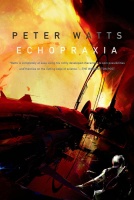Echopraxia is a side-quel to Watts's hugely successful Blindsight, taking place almost in parallel with the events of the latter. It continues Watts's argument against the utility of consciousness, expanding it to an argument against logic, reasoning, and the scientific method. The argument against the latter three proceeds in the same way as against the first - Watts acknowledges the utility of them, but believes they will be superseded by other methods by post-humans.

ISBN: 9781429948067
Tor Books, 2014-08-26
English
While the novel does have good parts, it's a three star novel wrapped around a five-star series of lectures. (4/5)
Post-humans like the crew of Theseus, which was sent out to the Oort cloud in Blindsight to make first contact with aliens that had surprised Earth with sixty-two thousand probes falling in a grid over the planet; and in Echopraxia, the crew of the Crown of Thorns, a spaceship sent towards humanity's giant solar power station in close solar orbit to investigate what is believed to be an intrusion by whatever it was Theseus encountered after going silent.
Unfortunately Echopraxia is hobbled by having a different structure than Blindsight: while Watts's argument for the superiority of non-conscious intelligence in Blindsight was largely independent of the plot, the plot in Echopraxia depends on Watts getting his scientific extrapolations right - and he doesn't. To put it another way - if the aliens in Blindsight hadn't been conscious, or if the matter had been in doubt, the story would still stand. In Echopraxia there are key plot elements that only work if you accept the author's handwaving. Sure, the plot element has basis in research, but that basis has been extrapolated so much that we're in the land of make-believe. The book therefore ends up alongside Schild's Ladder by Greg Egan: hard SF stops being hard SF if you turn your characters into demigods that for all practical purposes have no limitations. It's just bad fantasy by then - and Echopraxia does indeed have some cringe-worthy sections that belong more in a first attempt at fanfiction than in a book by an accomplished writer.
We follow a non-post-human, Dan Brüks[1], as he does what you'd expect a mortal among gods to do: cower in fear and generally be utterly clueless about what's going on. This perspective lets the author explain the world of Echopraxia to the reader by having other characters explain that same world to Brüks, and works surprisingly well. Watts may not get much credit for this, but he is a very good lecturer: the infodumps are structured, clear, easy to follow, and quite engaging.
Contrast that with the story and you get the impression that Echopraxia is Watts's thoughts on post-humanism and post-empiricism, violently pounded into the form of a science-fiction novel because that was the only template he had available. It's a book that is overflowing with ideas - some good, some bad, and some pretty far out there - that is struggling to mimic a novel.
Watts is really good at digging up interesting research results, and his scientific background coupled with his skill with words makes for a very interesting read. Just too bad about his having to slap a novel around all that genuinely interesting stuff. While the novel does have good parts, it's a three star novel wrapped around a five-star series of lectures.